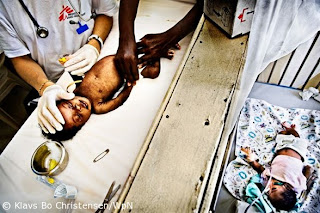
Il 2008 è stato l'anno delle sommosse per il cibo. L'aumento dei prezzi delle derrate alimentari ha causato l'agitazione di centinaia di persone ad Haiti, in Bangladesh, in Costa d'Avorio, proteste rumorose che hanno trovato spazio nei telegiornali della sera.
Meno visibile,ma ugualmente letale, è stato l'aumento della malnutrizione infantile.
Se combattere la fame significa garantire cibo a sufficienza, per sconfiggere la malnutrizione c'è bisogno di fornire alimenti ricchi di nutrienti, vitamine e minerali.
La malnutrizione, infatti, non va confusa con la scarsità di cibo;a determinarla concorrono diversi fattori: insufficienza di proteine, zuccheri e micronutrienti, malattie e infezioni contratte con frequenza. E ancora, una cattiva educazione alimentare,il consumo di acqua non potabile, pochi controlli medici e mancanza di igiene.
Secondo l'Organizzazione Mondiale della Sanità, sono 178 milioni i bambini che, in tutto il mondo, sono affetti da malnutrizione: 20 milioni sono colpiti dalla forma più acuta, e sono circa 5 milioni i bambini al di sotto dei cinque anni che ogni anno muoiono a causa di un'alimentazione non adeguata.Anche l'Unicef lancia l'allarme: la situazione peggiora sempre di più.
Nei "punti caldi",come Corno d'Africa, Sahel e Asia meridionale, molte famiglie non possono permettersi il lusso di alimenti nutrienti, come latte, carne e uova, necessari ai bambini per crescere sani. I loro pasti si basano su pappe di cereali a base di mais e riso:il nostro "pane ed acqua".
Gli aiuti internazionali non fanno abbastanza. Le miscele di farine arricchite di mais, grano e soya,che vengono distribuite dai programmi umanitari, non soddisfano le esigenze nutrizionali minime dei bambini tra i 6 e 24 mesi, più vulnerabili.
Le organizzazioni umanitarie stanno lavorando affinchè le agenzie internazionali inseriscano tra gli aiuti prodotti come gli alimenti terapeutici pronti all'uso,in grado di guarire, anche dopo brevi cicli di somministrazione, le forme di malnutrizione più gravi.
E' importante combattere la malnutrizione: il sistema immunitario dei bambini che ne sono affetti è così fragile che basta una semplice malattia per causare gravi complicazioni e addirittura la morte.
Infantile malnutrition: the silent alarm
2008 will be remembered as the year of the food riots. The price increase of the food supplies has caused the rising of hundreds of people in Haiti,Bangladesh,Ivory Coast:with their loud protests, they have found a place in the evening news.
The increase of the infantile malnutrition has been less visible,but it is equally lethal. Starvation can be fought by providing food; to fight aganist malnutrition it is even necessary to provide food that is rich of vitamins and minerals.
Malnutrition, in fact, is not only a lack of food;instead, it is caused by the combination of many differents factors: lack of proteins, sugar and micronutrients, illness and infections that are frequently contracted.Even incorrect dietary habits, undrinkable water, few medical checks, and bad igenical conditions are causes of malnutrition.
According to the World Health Organization about 178 millions of children, all over the world, are affected by malnutrition: 20 millions are struck by the most acute form, and about 5 millions children under 5 years die every year because of a not proper diet.Unicef declares that the situation is getting worse and worse: in the "hot places", such as Africa, Sahel and South Asia, lots of family cannot afford to get nourishing foodstuffs, that are necessary to the children's health.Their meals are based on cereals, maize and rice: they are similar to our "bread and water".
International helps aren't enough. The flours enriched with maize, corn and soya,that are usually given by humanitarian programs, can't satisfy nutritional needs of the children among 6 and 24 months, that are the most vulnerable.
Humanitarian Organizations are working: they want the internation agency to add among helps products such as the therapeutical food ready to use. It can cure the worst form of malnutrition, even after a short administration.
It is important to fight malnutrition, the immune defance system of the affected children is very weak: a simple desease can cause serious consequences, and even death.